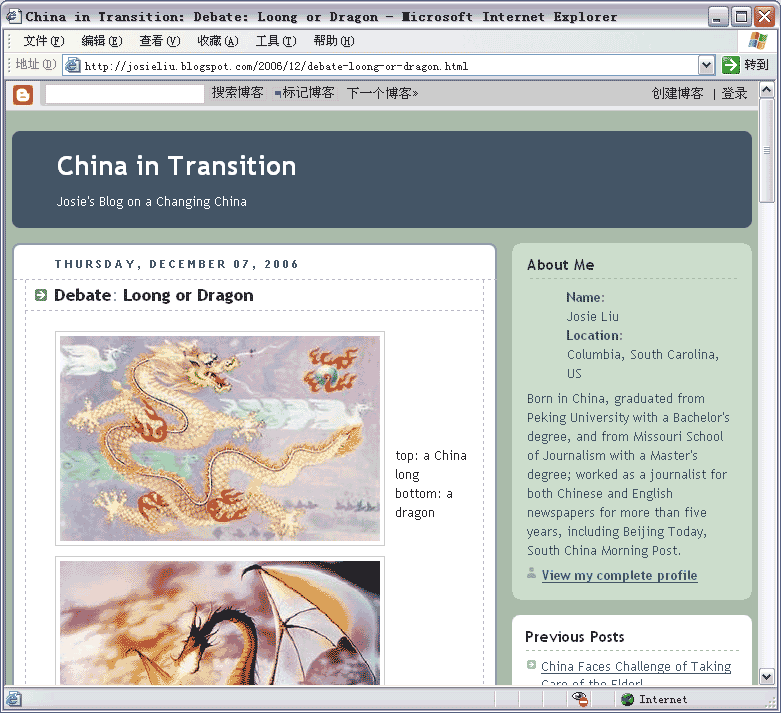
| 首页 导航地图 论坛 为龙正名 媒介 No
Dragon 对龙的误解 Loong
的英文解释 Loong 的应用实例 |
对龙争论的来龙去脉描述得比较准确和全面的英文报道 来源:Josie's Blog on a Changing China A scholar's proposal of abandoning long, or Chinese dragon, as the symbol image of China triggered a hot public debate about this thousands-of-years-old emblem, particularly the English translation of its name. Early this month, Prof. Wu Youfu, a top administrator of Shanghai International Studies University, said in a local newspaper story that long is not suitable to be the symbol of China's national image, because dragon is seen in the western world as "a monster full of arrogance and offensiveness." He suggested that the symbol should be something resonating China’s peaceful rise strategy and avoiding westerners’ misconceptions about Chinese culture. Prof. Wu is also leading a research project on rebuilding China's national image. Soon after these comments were published, Prof. Huang Ji of East China Normal University, also in Shanghai, criticized Prof. Wu's proposal as "ridiculous." Nothing is wrong with long, according to Prof. Huang, and what went wrong is the English translation of long as "dragon." It is dragon that is seen as "full of arrogance and offensiveness," not long, and "a lot of Chinese scholars studying the English language have written articles to point that out," Prof. Huang wrote in his blog on xmnext.com. He made a different proposal: not to change long as China's symbol, but change the translation from dragon to long, or loong. The alternative translations are already in use in some cases. Dragon, according to English dictionaries, is a mythical monster with
wings, claws and spouting fire, and is often associated with evilness
or fierceness. In contrast, long in traditional Chinese culture is an
auspicious symbol, indicating opulence, happiness and good power, mostly
a positive notion. It is translated as dragon probably because the two
imaginary creatures both have snake-like bodies, Prof. Huang told xmnext.com. On the Internet, the mast majority of commentators harshly denounced Prof. Wu's proposal, except for few comments supporting his idea on the basis that long was for a long time only the symbol of China's ancient emperors. People expressed their anger at the Prof. Wu's idea. "As the symbol and image of China, long has been connected by flesh and blood with Chinese history and civilization, with every single Chinese people, for a long, long time, without interruption," one people commented on the Internet. "To get rid of long is to cut the root!" Many people were particularly angry at the fact that Prof. Wu's proposal was based on the concern of westerners’ possible "misinterpretation" of the image of long. Some even went so far as to label Prof. Wu with treachery. "I despise people like Wu Fuyou," one wrote. "People like that don't deserve to be Chinese," wrote another. In an online survey on sina.com.cn, over 90 percent of the participants supported long as the national symbol, and over 80 percent agreed with changing the translation. Prof. Huang started a website, http://www.loong.cn/, to advocate for changing the translation, and hopes the government would adopt his suggestion. http://news.sina.com.cn/c/p/2006-12-07/111211725860.shtml 作者自我介绍: |

首页 导航地图 论坛 为龙正名 媒介 No Dragon 对龙的误解 Loong 的英文解释 Loong 的应用实例 龙 Loong 网主编信箱:mail@loong.cn |
* 题图装饰背景图片取自荷花塘网站 |